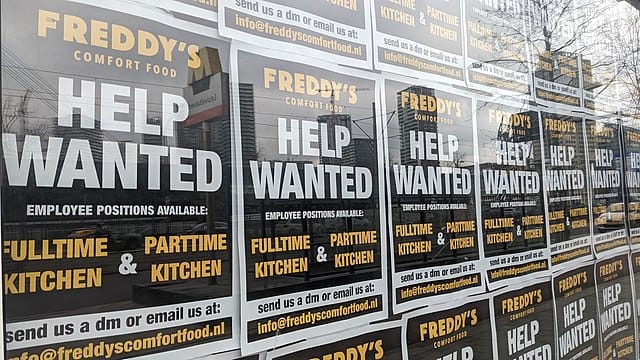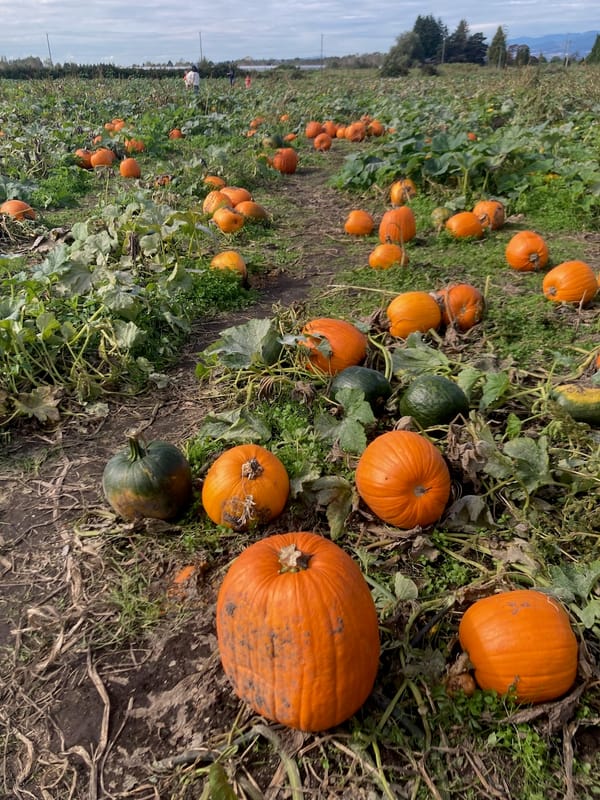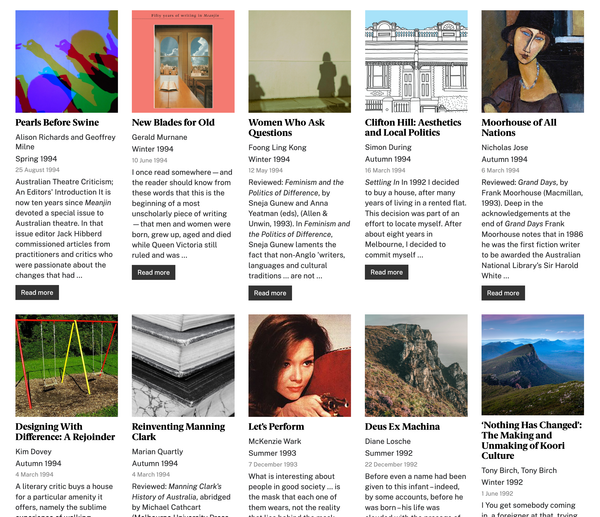Help Wanted
What they left out of the position description for the boss job at Writing Australia – plus John Jeremiah Sullivan, Jennifer Mills, Andrew Dean and Mel Brooks

There's been a launch date hovering for years for Writing Australia, yes, the long-awaited, much ballyhooed Writing Australia: 1 July 2025. That's next week and so far as I can tell, it's not quite time to crack the champagne. Talk about great expectations: authors, publishers and assorted industry bods have been assured that the launch of Writing Australia will mark a new era for Australian literature. Our work will finally be visible in the mysterious apparatus of federal cultural policy, which remains dominated by the performing and visual arts. Only, there doesn't seem to be any new funding for this marvellous new body, and substantial administrative resources have been devoted to setting it up, without much information trickling out into the world. We've been told to be patient, it's coming.
There is now reason to be a hair more optimistic. Creative Australia is advertising for a Director of Writing Australia. Like many others, I am curious about where this appointment process goes, especially knowing there are several excellent potential candidates on the prowl, including within Creative Australia. My view, the view from Vancouver, is that the sector needs a brawler in this position, someone willing to make themselves conspicuous and unpopular as they stand up for writers and publishers, for peer review processes with integrity, for artistic freedom, and for literature as valuable in and of itself. That may not be in the job description (it's not) but I don't see how the objective to build the organisation can possibly be achieved without this kind of visible advocacy. We do have some courageous advocates associated with literary organisations, especially Australian Society of Authors Chair Sophie Cunningham and CEO Lucy Hayward. And there are writers, both established and emerging, who are forthright in their contributions to public debate about artistic freedom and cultural policy. Many more are silent for fear of losing contracts, funding, work, relationships. In her Stella speech, Michelle de Kretser spoke eloquently and directly to the fear she experienced speaking up about Palestine; the risks of speaking about Gaza are self-evident and in conflict with the moral imperative to do so; this fear is enhanced by the general precarity that governs the making and circulation of Australian literature.
You know where this is going, right? Nick Feik wrote a great response to the Lattouf decision last week on his Substack, pointing to the damage that Australian cultural institutions, such as the ABC, Creative Australia, the MSO and the SLQ, have inflicted upon themselves, and upon the culture at large, in their efforts to appease the Israel lobby and the Murdoch media; 'there is a common fallacy,' he writes, 'that these institutions are protecting themselves when they hang individuals out to dry. Pressure campaigns rely on this notion when in fact the opposite is true: board members and chief executives made knee-jerk decisions under the pressure of a news deadline, thinking they’d dampen the threat, only to find the repercussions were much greater. Catastrophic, in fact.' These institutions failed to defend the liberal values upon which they were supposedly founded in desperate and misguided gestures towards self-preservation. And they abandoned their duty of care to their employees and to artists, damaging not only those at the centre of the scandals, like Khaled Sabsabi and Antoinette Lattouf, but all their colleagues and associates. 'The institutions didn’t try to understand or clarify the views of their artists/ creators/ employees, or protect them in any way. They just cancelled them, leaving them to face wild accusations and acrimony. The signal was clear, and chilling.'
What exactly was the signal? Alison Croggon covered some of same ground as Feik in her recent Meanjin essay on Creative Australia, in which she criticises the corporate capture of Australian cultural institutions. Her phrasing of the signal being sent by these institutions to the sector: 'When push comes to shove, it has long been clear that the artist—and the art—will always be sacrificed for the organisation.'
Whoever is appointed to lead Writing Australia is stepping into an institution, Creative Australia, that has broken faith with artists, and will be doing so at a historical moment when the right of Australian artists and writers to express their political views is being constrained by the very liberal institutions that are supposed to protect that right. It's my strong suspicion that the board of Creative Australia does not want to appoint a brawler, because a brawler would shout at the board about the pathetic proportional allocation of funding to literature, and would come out swinging in favour of the freedom of writers to express their views. A brawler would not stay on message. A brawler might even call out the outrageous campaigns undertaken against artists via the Murdoch media. And of course, this is a public service role, and some readers are probably murmuring to themselves about public service values like discretion and impartiality, about how unprofessional this all sounds, about what's needed to work within the system. Creative Australia wants someone who can step in and do some much-needed damage control, who can build back the trust of writers and publishers, who will look like a safe pair of hands, administratively and politically. Is that incompatible with a forthright defence of writers and freedom of speech? A few years ago I wouldn't have thought so, but now I'm not so sure.
Vancouver is not under a heatdome (yet) but we are drenched in light, and, per Blake, we lack not 'laurel wreaths against the sultry heat'. School's almost out and we are not going to Disneyland. My kids don't know it and right now probably don't care but we are never going to Disneyland. Sentimental writing about summer proliferates but nothing is ever going to top John Jeremiah Sullivan on getting stoned and going to Disneyland with his kids (though the letters to the NYT about this piece do come close):
Something you learn rearing kids in this young millennium is that the word “Disney” works as a verb. As in, “Do you Disney?” Or, “Are we Disneying this year?” Technically a person could use the terms in speaking about the original Disneyland, in California, but this would be an anomalous usage. One goes to Disneyland and has a great time there, probably — I’ve never been — but one Disneys at the Walt Disney World Resort in Florida. There’s an implication of surrender to something enormous – You Blow My Mind. Hey Mickey! (2011).
I went back to Pulphead (2011) and some JJS all-timers (yes, on Axl Rose) after reading his new one on Mark Twain in Harper's, which also deals with Percival Everett's James (2024) and Ron Chernow's doorstop Twain bio, but mainly is about Twain. Maybe one day I'll write my own essay about reading and teaching Twain in Bankstown in the early 2010s, a piece studded with vignettes about the PS Cumberoona, my childhood on the banks of the mighty Murray River, and some reflection on the dangerous charisma of 19th century Americana in regional Australia. Don't hold your breath. In the meantime I recommend this piece equally to Twain-heads, readers hostile to Twain and the new Twain-wave, and even to those who have never, somehow, never read him:
I grew up so hopelessly steeped in the cult of Twain that I have to perform a mental adjustment to understand how a Twain revival could be possible. How does one revive what is ever-present and oppressively urgent? My sportswriter father, who died when I was in my mid-twenties, worshipped Twain, to the extent of wearing, every year on specific occasions, a tailored white suit. With the shaggy hair and Twainish mustache that he maintained year-round, the object of the homage was unmistakable. I was raised in New Albany, Indiana, across the Ohio River from Louisville, Kentucky, and in the late Seventies, when I was a boy, some of the last of the old-time steamboat races were held there. One of my earliest memories is of being taken down to the riverfront at the age of four to watch that spectacle. Twain’s face was everywhere. It was on TV, in a disturbing Claymation film called The Adventures of Mark Twain, which, I have since learned from the internet, gave bad dreams not just to me but to my whole microgeneration - 'Twain Dreams' (2025).
There aren't many publications in the world that have the resources to support this kind of feature writing, and particularly in the domain of culture. I can't think of any in Australia, bar The Monthly now and then. No wonder, though, given the depth of research in these pieces, the sheer time spent with the subject over months or years, chewing over context, reading, whether it's a piece about Axl Rose or a very different kind of musician like Rhiannon Giddens, or indeed Twain. It's work that can't be done for a fee of a couple of thousand bucks (if you're lucky), and for all the boosterism about Substack, I don't really think it can be done in the newsletter mode either. (Don't get me started on whether the next great American novel will be published on Substack...)
I reviewed Jennifer Mills' wonderful novel Salvage for Guardian Australia. I quite like writing concise reviews, but wished I'd had another thousand or so words for this one. I re-read half of The Dispossessed (hardship posting) before realising I just didn't have the space (or the time) to put Salvage into dialogue with what I think is Ursula LeGuin's best novel. Salvage is clearly ready to have a conversation with The Dispossessed and if you haven't read either novel, my recommendation is that you do yourself a favour and read them both, one after the other.
There's a corker of a discussion of Graeme Turner's new book on Australian universities in Inside Story, authored by Andrew Dean. He questions, rightly, the commitment of political leaders across the sector to sustaining higher education in Australia, pointing out that one side of politics would 'happily destroy the university system as we know it'. This is in fact what is happening in the United States, with terrifying efficiency; even the most sluggish of Coalition MPs are going to figure out how to translate this aspect of Project 2025 into the Australian context. It's baffling and infuriating to be living through an epoch of ALP majority - which won't last forever - and to see the party squandering their so-called mandate on timid centrism, and allowing the higher education sector to stagnate (and all the rest of it). As Dean says, the Coalition will eventually regain office, things will get worse, and people will look back to 2025, a year in which yet more job cuts and restructurings are slated, as an easier time. He writes:
Most discussion of universities in Australia comprises interminable culture wars about who protested what, what an academic said, and what should and should not be taught. The truth is that my students are struggling just to get by; the university has little interest in ensuring they have learnt something; and most academics, with their positions constantly under threat, are just happy to have work at all. Curriculum debates have receded behind funding worries, whatever the Australian might believe. I was surprised to learn about the encampments across Australian universities protesting the war in Gaza, not because I thought that students were apathetic, but because our campuses have been dramatically emptied.
Great piece, with a helluva mic drop at the end.
And finally, this week the mighty Mel Brooks celebrates his 99th birthday, may he live to be as old as Methuselah, or at least to see the release of Spaceballs 2. The Guardian was on it before me and compiled a list of his ten best films (obviously someone made a mistake in ranking Young Frankenstein over The Producers). Anyway, hey Torquemada, whaddya say?


